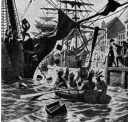The
American Revolutionary War: Keeping
Independence
The American Revolutionary War did not begin with the "Shot Heard 'Round the World" (the battles of Lexington and Concord). It had its roots in the very first settlements in North America. From the beginning, the American colonists were used to doing things their own way. Yes, they came from Great Britain, but Great Britain was a great many miles away. When problems arose, the people in America fixed those problems themselves, rather than waiting for Britain to tell them what to do. This practice wasn't always popular with the British government.
And when the British-American side won that war, the Americans got to go back to their way of life as they knew it, with one important difference: The British government was very much in debt. Britain's George Grenville, who was in charge of the Treasury, decided that the American people should pay a large part of the money Great Britain owed to its banks and to other countries that had given it money to buy weapons and to otherwise fight the French and Indian War. The American people had no say in this matter, and they were angry because of that and because the new taxes were very high. Some examples of these were the Sugar Act (1764) and the Stamp Act (1765), both of which taxed two things that the American people used every day (sugar and paper). These taxes proved very unpopular in America, and the people there made a lot of noise about unfair taxes. They even called a Stamp Act Congress and made a formal statement of protest to Great Britain. The British government did away with the Stamp tax the next year, but the damage was done. The American people had been able to voice their concerns and get a tax removed. But they had also learned how difficult it was to do this. The whole experience reminded them that they didn't have anyone from America sitting in the British government.
Boston was a hotbed of revolutionary feelings already. In 1770, at what Americans had come to call the Boston Massacre, unarmed Americans were shot and killed by armed British troops. And Boston would be the target of one of the Intolerable Acts (1774) later on: The Boston Port Act closed the port of Boston until the price of the dumped tea was recovered. In addition, the Massachusetts Bay Regulating Act made all law officers subject to appointment by the royal governor and banned all town meetings that didn't have approval of the royal governor. If Americans wanted to meet and discuss the terrible things the British government was doing to them, they would have to meet in secret. And meet in secret they did. Next page > They Got What They Wanted > Page 1, 2, 3 |
|
Social Studies for Kids
copyright 2002–2024
David White

 It
is worth noting that American soldiers (including a young
It
is worth noting that American soldiers (including a young
 Another
troublesome tax was the
Another
troublesome tax was the 
